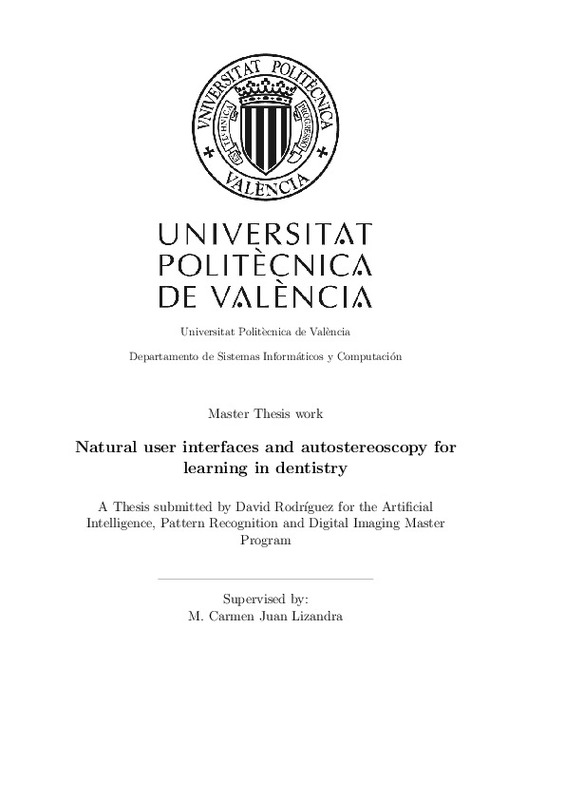JavaScript is disabled for your browser. Some features of this site may not work without it.
Buscar en RiuNet
Listar
Mi cuenta
Estadísticas
Ayuda RiuNet
Admin. UPV
Natural user interfaces and autostereoscopy for learning in dentistry
Mostrar el registro sencillo del ítem
Ficheros en el ítem
| dc.contributor.advisor | Juan Lizandra, María Carmen
|
es_ES |
| dc.contributor.author | Rodríguez Andrés, David
|
es_ES |
| dc.date.accessioned | 2014-03-04T12:47:08Z | |
| dc.date.available | 2014-03-04T12:47:08Z | |
| dc.date.created | 2013-09-27 | |
| dc.date.issued | 2014-03-04 | |
| dc.identifier.uri | http://hdl.handle.net/10251/36150 | |
| dc.description.abstract | [ES] En este trabajo de fín de máster, presentamos el desarrollo de un "juego serio" que combina autoestereoscopía e interfaces naturales de usuario en un entorno de educación superior. Para nuestro conocimiento, es la primera vez que una aplicaci on de estas caracter sticas es desarrollada y probada. Hemos desarrollado un juego que puede trabajar en dos modos, con un fondo real o con un fondo neutro. En los dos modos, dos manos virtuales se situan superpuestas a las manos del usuario en la pantalla. En el modo real las manos del avatar se situan encima de las manos del usuario, y el usuario puede ver el resto de su cuerpo. En el modo neutro, los usuarios saben donde estan situadas las manos gracias a las manos virutales, ya que no pueden ver su propio cuerpo. Nuestra hipótesis inicial era que, ya que el fondo real ofrece mas ayudas de la posición del usuario que el fondo neutro, habrá diferencias estadísticas significativas en el conocimiento adquirido por los usuarios. Treinta y tres estudiantes de odontología probaron el sistema. Los estudiantes estaban divididos en dos grupos para probar los dos sistemas. Realizamos un estudio para corroborar nuestra hipótesis. Hicimos un análisis estadistico de los resultados obtenidos en las pruebas. En los resultados obtuvimos que los usuarios aumentaban su conocimiento sobre el tópico del juego (morfología dental), y el incremento de conocimiento en los dos grupos fue muy similar. La mayoria de los usuarios preferían el fondo neutro ya que este fondo les distraía menos de la actividad que estaban realizando. Como conclusión final, el juego ha tenido una buena aceptación entre los estudiantes y los profesores, quienes nos recomendaron seguir trabajando en la aplicación y desarrollar nuevos sistemas sobre aprendizaje dental | es_ES |
| dc.description.abstract | [EN] In this thesis, we present the development of a new ¿serious¿ game that combines autostereoscopy and NUI for dental learning in higher education. To our knowledge, this is the first time a game of these characteristics has been presented. We developed a NUI game that can work in two modes, with a real background and with a neutral background. In the two modes, two avatar hands appear in the position where the users¿ hands are. In the real-background mode, the avatar hands are over the hands of the user, and the users can see the rest of their own body. In the neutral background mode, the users know their hand position from the avatar hands. Our hypothesis was that since the real-world background o ers more cues than the neutral background for a more e ective NUI, there would be a statistically signi cant improvement in knowledge. We tested the systems with thirty-three dentistry students. The students had divided in two groups to test the two systems. We carried out a study to test our hypothesis. We perform a statistical analysis of the results obtained in the tests. We obtained that the users increased their knowledge about the topic of the game (teeth morphology), and the increment of knowledge in both (real-world and neutral background) systems was similar. Most of the users preferred the neutral background for a dental application because it disturbed them less than the real-world background. As a final conclusion, the game has been well received by students and professors who recommend us to continue working in the system and to develop new applications about learning in dentistry. | es_ES |
| dc.format.extent | 76 | es_ES |
| dc.language | Inglés | es_ES |
| dc.publisher | Universitat Politècnica de València | es_ES |
| dc.rights | Reconocimiento - No comercial - Sin obra derivada (by-nc-nd) | es_ES |
| dc.subject | Autoestereoscopía | es_ES |
| dc.subject | NUI | es_ES |
| dc.subject | Odontología | es_ES |
| dc.subject | Aprendizaje | es_ES |
| dc.subject | Autostereoscopy | es_ES |
| dc.subject | Dentistry | es_ES |
| dc.subject | Learning | es_ES |
| dc.subject.classification | LENGUAJES Y SISTEMAS INFORMATICOS | es_ES |
| dc.subject.other | Máster Universitario en Inteligencia Artificial, Reconocimiento de Formas e Imagen Digital-Màster Universitari en Intel·Ligència Artificial: Reconeixement de Formes i Imatge Digital | es_ES |
| dc.title | Natural user interfaces and autostereoscopy for learning in dentistry | es_ES |
| dc.type | Tesis de máster | es_ES |
| dc.rights.accessRights | Abierto | es_ES |
| dc.contributor.affiliation | Universitat Politècnica de València. Servicio de Alumnado - Servei d'Alumnat | es_ES |
| dc.description.bibliographicCitation | Rodríguez Andrés, D. (2013). Natural user interfaces and autostereoscopy for learning in dentistry. http://hdl.handle.net/10251/36150 | es_ES |
| dc.description.accrualMethod | Archivo delegado | es_ES |






